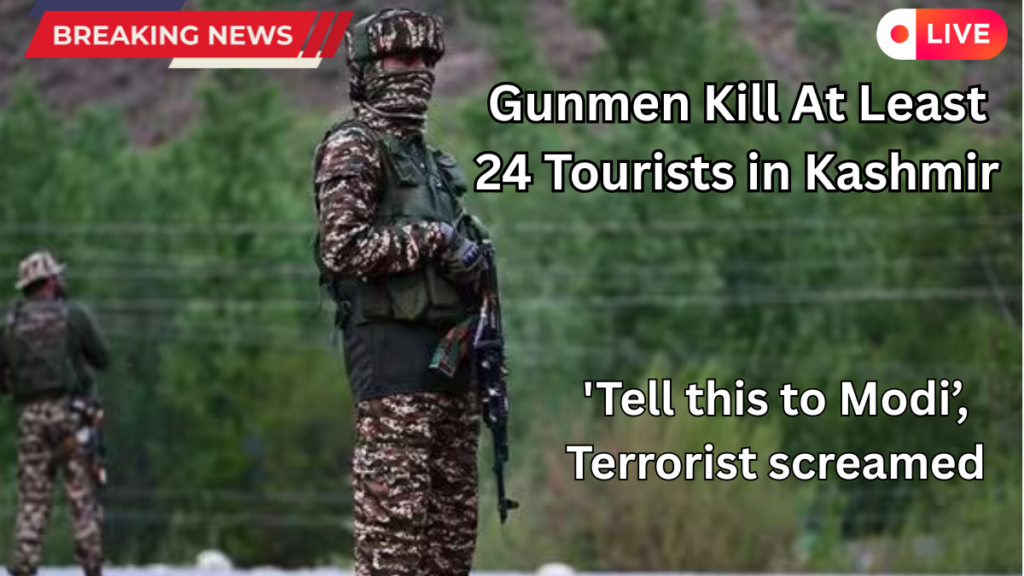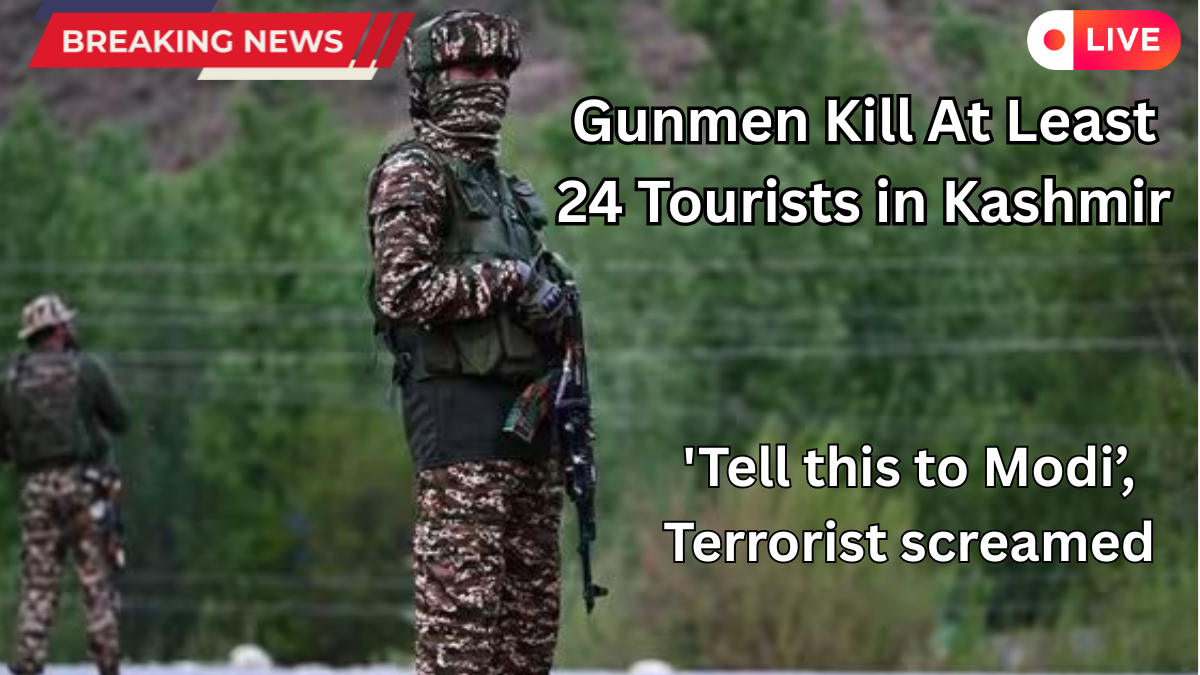In a horrifying act of violence, at least two dozen tourists were killed and many others injured when gunmen opened fire on a group of domestic travelers visiting Baisaran, a scenic meadow near the tourist town of Pahalgam in Indian-administered Kashmir.
Often referred to as the “Switzerland of India”, Pahalgam is known for its breathtaking Himalayan views. But on Tuesday, beauty turned to chaos as a peaceful vacation turned into a nightmare.

A Glimpse of the Attack
-
Location: Baisaran, about 5 km from Pahalgam town
-
Target: A group of Indian tourists, primarily from Gujarat
-
Casualties: At least 24 dead, dozens injured (some in critical condition)
-
Suspected Motive: Sectarian targeting, though unconfirmed
-
Perpetrators: No group has claimed responsibility
One eyewitness recounted the terrifying moment:
“There was shouting and screaming everywhere. We just ran. The gunmen seemed to be targeting non-Muslims. It was horrifying.”
Global Leaders React: A United Front Against Terror
The attack sparked global outrage, with several world leaders expressing their condolences and support for India:
| Leader | Country/Organization | Statement |
|---|---|---|
| Donald Trump | United States | “Deeply disturbing news… The United States stands strong with India against Terrorism.” |
| Vladimir Putin | Russia | Offered “sincere condolences” for what he called a “brutal crime.” |
| Ursula von der Leyen | European Union | Described the killings as a “vile terrorist attack.” |
| Narendra Modi | India | Vowed to bring the perpetrators to justice and strengthen India’s fight against terrorism. |
| Pakistan Foreign Ministry | Pakistan | Expressed “concern at the loss of tourists’ lives” and extended condolences. |
Emergency Measures and Response
In the wake of the massacre, the Indian government took swift action:
-
Prime Minister Modi cut short his Saudi Arabia visit and addressed the nation via X (formerly Twitter).
-
Home Minister Amit Shah flew to Srinagar for an emergency security review.
-
Lieutenant Governor Manoj Sinha confirmed the deployment of army and police forces to the area.
-
Search operations have been launched by Indian Army and Jammu and Kashmir Police.
Authorities said the attackers struck in a location not accessible by vehicles, making rescue operations more difficult.
Why This Attack Feels Different?
While Kashmir has seen decades of insurgency, this attack stands out:
-
Rare Targeting of Tourists: In 35+ years of conflict, tourists—especially domestic ones—have rarely been attacked in such large numbers.
-
Unverified Video Footage: Shared widely on social media, it shows panic, chaos, and possibly religious targeting—though this remains unconfirmed by authorities.
-
Previous Attacks on Civilians:
-
June 2024: 9 killed, 33 injured in an attack on a bus carrying Hindu pilgrims
-
2019: 46 soldiers killed in a suicide bombing in Pulwama
-
Kashmir: A Region in Turmoil
To understand the backdrop of this attack, here’s a quick snapshot of Kashmir’s recent history:
| Timeline | Event |
|---|---|
| 1947 | India and Pakistan become independent; Kashmir becomes a disputed territory |
| 1989 | Armed insurgency begins in Indian-administered Kashmir |
| 2019 | Article 370 revoked, ending Kashmir’s partial autonomy |
| Present | 500,000 Indian soldiers stationed; claims of reduced violence persist |
Despite government efforts to normalize the region and boost tourism, incidents like these reveal the fragile peace in the valley.
Tourism: A Growing Industry Shaken by Tragedy
Kashmir has recently witnessed a resurgence in tourism:
-
3.5 million tourists visited in 2024
-
Government campaigns focused on showcasing Kashmir as a safe, picturesque destination
-
Pahalgam, nestled amidst pine trees and snow-capped mountains, was central to that vision
This attack, however, poses a serious threat to that progress.
What Happens Next?
With the region in mourning, Wednesday is expected to see:
-
Protests across major cities in Kashmir
-
Heightened security across tourist hotspots
-
Investigation and combing operations continuing in and around Baisaran
FAQs:
1. Who carried out the Pahalgam attack?
No group has officially claimed responsibility yet. Authorities suspect local militant groups but are still investigating.
2. Is it still safe to visit Kashmir?
While the government has increased security, travel advisories may change depending on the evolving situation. Tourists are urged to check with local authorities before planning travel.
3. Why were tourists targeted?
This attack is unusual in Kashmir’s long conflict. Eyewitness accounts suggest sectarian motives, but official confirmation is awaited.
4. What is being done to help the victims?
Injured tourists have been hospitalized, with critical cases receiving emergency care. The government has pledged support and launched search-and-rescue efforts in the area.
Click here to learn more
